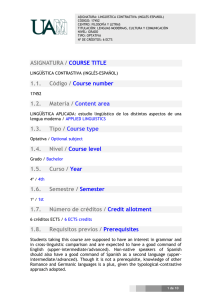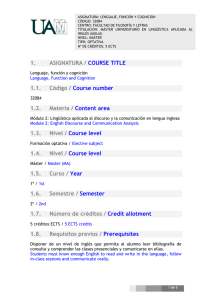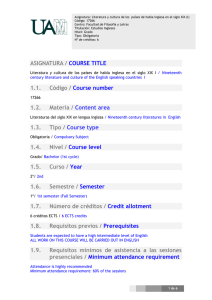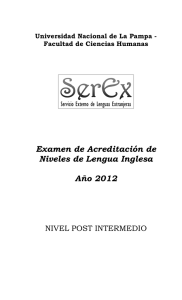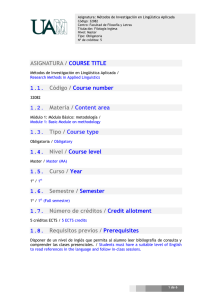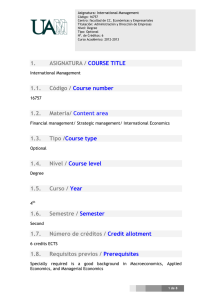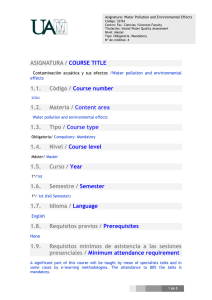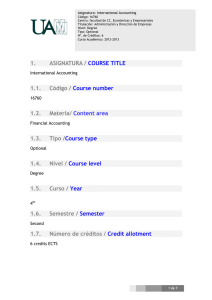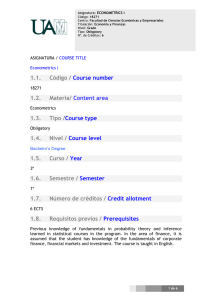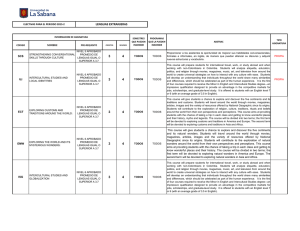ASIGNATURA / COURSE TITLE 1.1. Código / Course number 1.2
Anuncio
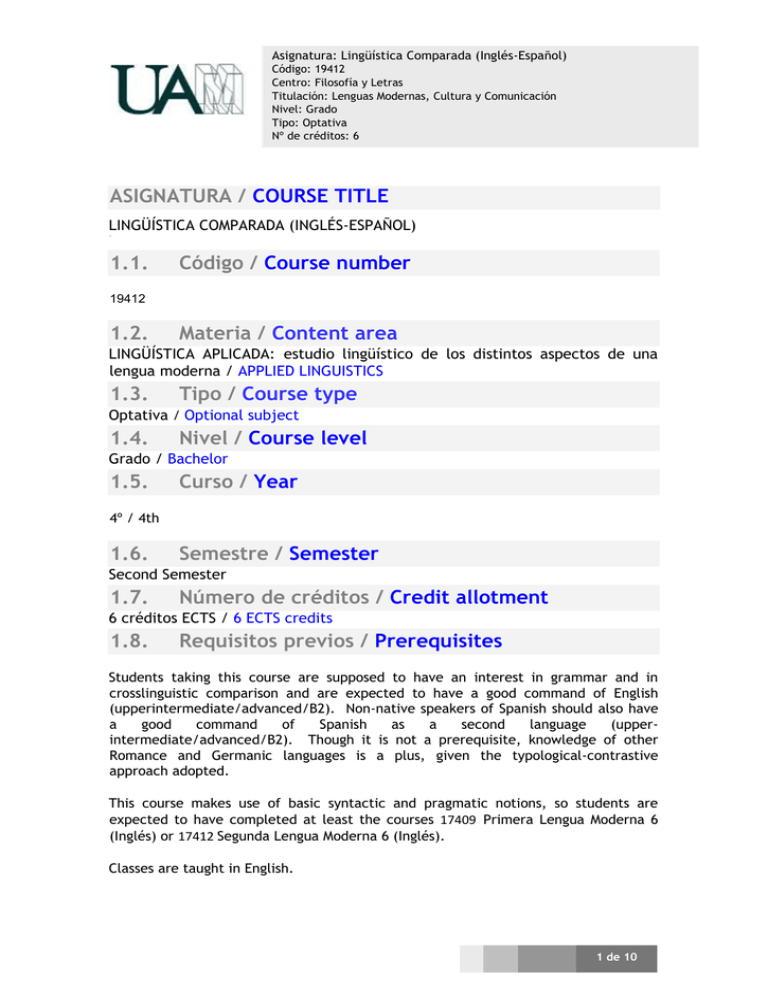
Asignatura: Lingüística Comparada (Inglés-Español) Código: 19412 Centro: Filosofía y Letras Titulación: Lenguas Modernas, Cultura y Comunicación Nivel: Grado Tipo: Optativa Nº de créditos: 6 ASIGNATURA / COURSE TITLE LINGÜÍSTICA COMPARADA (INGLÉS-ESPAÑOL) EN 1.1. Código / Course number 19412 1.2. Materia / Content area LINGÜÍSTICA APLICADA: estudio lingüístico de los distintos aspectos de una lengua moderna / APPLIED LINGUISTICS 1.3. Tipo / Course type Optativa / Optional subject 1.4. Nivel / Course level Grado / Bachelor 1.5. Curso / Year 4º / 4th 1.6. Semestre / Semester Second Semester 1.7. Número de créditos / Credit allotment 6 créditos ECTS / 6 ECTS credits 1.8. Requisitos previos / Prerequisites Students taking this course are supposed to have an interest in grammar and in crosslinguistic comparison and are expected to have a good command of English (upperintermediate/advanced/B2). Non-native speakers of Spanish should also have a good command of Spanish as a second language (upperintermediate/advanced/B2). Though it is not a prerequisite, knowledge of other Romance and Germanic languages is a plus, given the typological-contrastive approach adopted. This course makes use of basic syntactic and pragmatic notions, so students are expected to have completed at least the courses 17409 Primera Lengua Moderna 6 (Inglés) or 17412 Segunda Lengua Moderna 6 (Inglés). Classes are taught in English. 1 de 10 Asignatura: Lingüística Comparada (Inglés-Español) Código: 19412 Centro: Filosofía y Letras Titulación: Lenguas Modernas, Cultura y Comunicación Nivel: Grado Tipo: Optativa Nº de créditos: 6 1.9. Requisitos mínimos de asistencia a las sesiones presenciales / Minimum attendance requirement Attendance to lectures (theoretical sessions) is highly recommended Attendance to practical lessons is compulsory. A minimum of 80% attendance to practical lessons will be required for evaluation of the percentage attributed to practical classes in the overall evaluation of the course. 1.10. Datos del equipo docente / Faculty data AMAYA MENDIKOETXEA (course coordinator) Department of English Philology Faculty of Arts Office: 204/ Módulo VI Bis Tel. 914973785 e-mail: [email protected] Webpage: Moodle Website at http://www.uam-virtual.es/ 1.11. Objetivos del curso / Course objectives A) Description: - Module: Profundización en Lengua Moderna: Español, Francés, Inglés Subject: Lingüística Aplicada Description: This course offers a description of certain morpho-syntactic and lexico-grammatical aspects of English and Spanish, from a typological-contrastive approach. A detailed analysis is provided of (i) the inflectional system of English and Spanish verbs and nouns; (ii) clause structure, particularly regarding word order in declarative and interrogative sentences, as well as the internal structure of noun phrases and verb phrases; and (iii) contrastive aspects of the formmeaning relation in English and Spanish. In all topics, basic concepts for contrastive grammatical analysis are introduced, as we cover a wide range of empirical facts. B) Skills: This course works towards the attainment of the following skills associated with the degree in Modern Languages, Culture and Communication at UAM: G1 Dominar dos lenguas extranjeras en los niveles C2 y B2 del Marco Común Europeo de Referencia para las Lenguas desarrollando competencias interpersonales, sociales e interculturales. 2 de 10 Asignatura: Lingüística Comparada (Inglés-Español) Código: 19412 Centro: Filosofía y Letras Titulación: Lenguas Modernas, Cultura y Comunicación Nivel: Grado Tipo: Optativa Nº de créditos: 6 G1 G5 G5 E5 E5 E6 E6 E7 E7 E14 E14 E20 E20 E24 E24 To reach a good command of two foreign languages (at levels C2 and B2 of the Common European Framework of Reference for Languages) whilst developing interpersonal, social and intercultural skills. Conocer explícitamente el sistema lingüístico de las lenguas del grado en su vertiente sincrónica y diacrónica. To have explicit knowledge of the linguistic systems of the languages studied in the degree from in synchrony and in diachrony. Conocer los aspectos definitorios de las lenguas del grado desde un punto de vista contrastivo. To know the main characteristics of the languages studied in the degree, from a contrastive point of view. Conocer el funcionamiento formal y pragmático del lenguaje humano. To know the formal and pragmatic use of human language. Distinguir normas y usos lingüísticos y saber analizarlos. To distinguish between language norm and usage, and to know how to analyze both types. Analizar textos y discursos en perspectiva comparada utilizando técnicas de análisis lingüístico, literario y sociohistórico. To analyze texts and discourses from a comparative perspective using techniques of linguistic, literary and sociohistorical analysis. Adquirir destrezas para la recogida, tratamiento y análisis de datos lingüísticos. To acquire skills for the collection, treatment and analysis of linguistic data. Comparar hechos lingüísticos e hitos literarios en distintas lenguas. To compare linguistic and literary phenomena in different languages. T3 Alternar entre los planos del razonamiento abstracto y el cotidiano. T3 To know how to move between abstract and everyday reasoning. T10 Posicionarse críticamente ante las distintas teorías y ante los distintos enfoques hacia un mismo problema. T10 To adopt a critical stance to different theories and approaches to a given problem. By the end of the course students should have: 3 de 10 Asignatura: Lingüística Comparada (Inglés-Español) Código: 19412 Centro: Filosofía y Letras Titulación: Lenguas Modernas, Cultura y Comunicación Nivel: Grado Tipo: Optativa Nº de créditos: 6 • • • • Gone further into the knowledge of their main language, its literature and culture, as well as the teaching of it as a foreign language. Applied techniques of linguistic analysis to their main language, in particular to aspects relevant to multilingual communication and language contact. Reflected upon social, economic, historical, artistic and/or scientific issues against the cultural background of their main language. Transmitted information, ideas, problems and solutions in a critical and cogent way in their main language. The activities in this module work towards achieving the competences listed beforehand. C) Learning outcomes Towards the end of this course students are expected (i) to have acquired a conceptual framework for the contrastive description of the grammars of English and Spanish and of Romance and Germanic languages in general and (ii) to know how to analyse syntactic and pragmatic aspects in equivalent constructions in English and Spanish from a typological-contrastive perspective. In particular, students are expected: • • • • • • • To become familiar with basic theoretical concepts of typological-contrastive analysis and to be able to distinguish the general characteristics of Romance and Germanic languages. To become familiar with some basic concepts for formal and functional contrastive analysis and their application to the analysis of central constructions in English and Spanish. Read critically and understand selected chapters from descriptive grammars of English and Spanish and introductory texts to grammatical analysis and be able to reproduce their content. Define and explain basic concepts for the contrastive grammatical analysis of phrases and basic clauses in English and Spanish. Describe formal contrastive facts of English and Spanish using the right terminology and tools for grammatical description (e.g. syntactic representations, tests, etc.). Describe functional contrastive facts of English and Spanish using the right terminology and tools for pragmatic description and, in particular, information structure. Isolate in texts and clauses characteristic aspects of the grammars of English and Spanish from a contrastive perspective 4 de 10 Asignatura: Lingüística Comparada (Inglés-Español) Código: 19412 Centro: Filosofía y Letras Titulación: Lenguas Modernas, Cultura y Comunicación Nivel: Grado Tipo: Optativa Nº de créditos: 6 1.12. Contenidos del programa / Course contents 1. INTRODUCTION TO TYPOLOGICAL CONTRASTIVE ANALYSIS 2. WORD ORDER IN ENGLISH AND SPANISH 3. VERB MORPHOLOGY & SYNTAX IN ENGLISH AND SPANISH 4. NOUN MORPHOLOGY & SYNTAX IN ENGLISH AND SPANISH 5. FORM-MEANING COMBINATIONS IN ENGLISH AND SPANISH 1.13. Referencias de consulta / Course bibliography There is no textbook for the course as such. However, we will frequently use introductory texts to the contrastive analysis of English and Spanish and descriptive grammars of English and Spanish, as well as general books on linguistic typology. There is a Course Reader containing a selection of readings related to the material covered in class, as well as to specific parts of the program which are not dealt with in much detail in class. Arnaiz, R., 1998. ‘An overview of the main word order characteristics of Romance’, In A, Siewierska (ed.) Constituent Order in the Languages of Europe. Berlin: Mouton de Gruyter Castillo, C., 2003. English Syntax for Spanish Speakers: A Comparative Introduction. Bern & Berlin: Peter Lang AG, European Academic Publishers, 2003. Greenberg, J. H., 1963. ‘Some Universals of Grammar with Particular Reference to the Order of Meaningful Elements’, In: Joseph H. Greenberg (ed.). Universals of Language. London: MIT Press, pp. 76-80. Available from http://angli02.kgw.tuberlin.de/Korean/Artikel02/ Holmberg, A. & J. Rijkhoff , 1998. ‘Word Order in the Germanic Languages’. In A, Siewierska (ed.) Constituent Order in the Languages of Europe. Berlin: Mouton de Gruyter Whaley, L. J., 1997. Introduction to Language Typology. The Unity and Diversity of Language. Thousand Oaks: SAGE Publications. Whitley, M. S., 2002. Spanish/English Contrasts, 2nd edition (expanded and updated), Georgetown: Georgetown University Press. 5 de 10 Asignatura: Lingüística Comparada (Inglés-Español) Código: 19412 Centro: Filosofía y Letras Titulación: Lenguas Modernas, Cultura y Comunicación Nivel: Grado Tipo: Optativa Nº de créditos: 6 2. Métodos docentes / Teaching methodology a) In-class sessions 1. Lectures (Theoretical sessions) Two hour theoretical sessions will take place once a week from September to December. They will take the form of lectures but they will be constructed around practical examples and problem-solving activities in order to provide students with the necessary conceptual framework and the tools for self-study. As part of these sessions there will be discussion and practical activities. 2. Practical sessions Practical sessions will focus on the correction of exercises and tasks related to the topics discussed in lectures and to the demonstration of the methodology for analysis and problem solving activities, and data construction. They may involve the whole class or smaller groups. 3. ECTS Tutorials ECTS tutorials will take place throughout the whole term, either individually or in small groups. Their basic aim is to provide students with the necessary guidance for the successful completion of practical tasks. b) Self-study and supervised work 1. Reading of basic and complementary references Students must read and assimilate the selection of readings for each of the topics. Before each topic there will be some obligatory reading assignments 2. Practical tasks Students will have to complete a number of tasks, more elaborate and longer in extension than the exercises referred to in section 3 below. Their purpose is to help students develop the skills to apply the theoretical concepts seen in class to the analysis of particular contrastive facts in English and Spanish. They will emphasize the construction of linguistic argumentation. 3. Problem-solving activities and exercises Students must do the set of exercises that are included at the end of each topic to practice and revise what has been done in class. They consist of practical exercises based on problem-solving activities. 6 de 10 Asignatura: Lingüística Comparada (Inglés-Español) Código: 19412 Centro: Filosofía y Letras Titulación: Lenguas Modernas, Cultura y Comunicación Nivel: Grado Tipo: Optativa Nº de créditos: 6 4. Additional tutorials This is our conventional tutorial during office hours for guidance and supervision, to answer questions students may have on the content of the course, and so on. These tutorials can either be face-to-face or online. 5. Self-study for the exam 7 de 10 Asignatura: Lingüística Comparada (Inglés-Español) Código: 19412 Centro: Filosofía y Letras Titulación: Lenguas Modernas, Cultura y Comunicación Nivel: Grado Tipo: Optativa Nº de créditos: 6 3. Tiempo de trabajo del estudiante / workload Student Nº de horas Clases teóricas Clases prácticas Presencial No presencial 4. 42 h Tutorías programadas a lo largo del semestre 3h Seminarios 2h Realización del examen final 3h Realización de actividades prácticas 50 h Estudio semanal (2 horas x 15 semanas) Preparación de las pruebas finales Carga total de horas de trabajo: 25 horas x 6 ECTS Porcentaje 30 h 20 h 150 h 33% (mínimo) = 50 horas 67% Métodos de evaluación y porcentaje en la calificación final / Evaluation procedures and weight of components in the final grade a) Evaluation components and percentages of final grade (Both in ordinary and extra evaluation): b) Evaluation components and percentages of final grade (Both in ordinary and extra evaluation): 1) Exam: 2) Questions: Presentations: 60% 10%* 3) Tasks & Exercises: 10% * 4) 10% 5) Practical class attendance: 10%** *To be considered for evaluation tasks and exercises will have to be handed at the times set by the lecturer during the semester. The percentage obtained in these component will be added to that of the other three components for the final grade [but see below for the extra evaluation]. **A minimum of 80% attendance to practical lessons will be required for evaluation of the percentage attributed to practical classes in the overall evaluation of the course. Participation will be taken into consideration. 8 de 10 Asignatura: Lingüística Comparada (Inglés-Español) Código: 19412 Centro: Filosofía y Letras Titulación: Lenguas Modernas, Cultura y Comunicación Nivel: Grado Tipo: Optativa Nº de créditos: 6 c) Minimum to be evaluated for the course: Students who hand in tasks and exercises will be evaluated for the course, even if they do not attend the exam. d) Extra evaluation (June) - - - 5. If a student fails the May exam, the percentage for the other evaluation components will be carried forward to the extra evaluation so that his/her final grade will be the sum of all the evaluation components. The 10% allocated to attendance and the 10% of class presentations ARE NOT recoverable after the semester is over: a) The percentage allocated to this component at the end of the semester will be added to the grade obtained for the other to components in June/July b) Students who do not reach the minimum attendance for these component to be considered for evaluation will be evaluated on the basis of the other components both in May and in June (maximum grade 8). The 20% allocated to tasks and exercises is recoverable up to 10% for the evaluation in June/July. This means that students who do not hand in the tasks and exercises during the semester will be given extra work which will amount to 10% of the grade to be completed between the date of the exam in January and the date of the exam in June (maximum grade 8). Cronograma / Course calendar Semana Week Contenido Contents Horas presenciales Contact hours Horas no presenciales Independent study time 1 Topic 1 3 6 2 Topic 1 3 6 3 Topic 2 3 6 4 Topic 2 3 6 9 de 10 Asignatura: Lingüística Comparada (Inglés-Español) Código: 19412 Centro: Filosofía y Letras Titulación: Lenguas Modernas, Cultura y Comunicación Nivel: Grado Tipo: Optativa Nº de créditos: 6 5 Topic 3 3 6 6 Topic 3 3 6 7 Revision: Topics 1-3 3 9 Tutoría 1,5 8 Topic 4 3 6 9 Topic 4 3 6 10 Topic 5 3 6 11 Topic 5 3 6 12 Presentations 3 6 13 Presentations 3 6 14 Revision: 3 9 Tutoría 15 16 1,5 3 10 Examen 10 de 10
